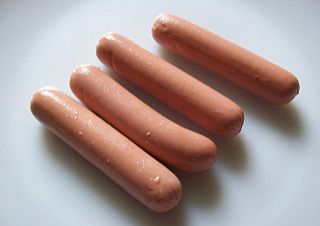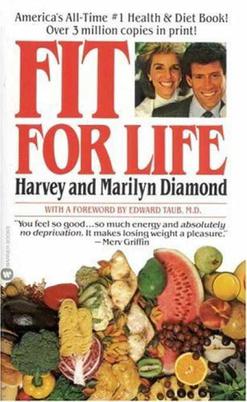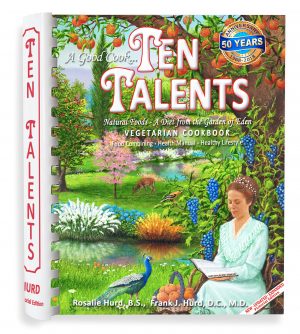
Veganism is the practice of abstaining from the use of animal products—particularly in diet—and an associated philosophy that rejects the commodity status of animals. A person who follows the diet or philosophy is known as a vegan.

Vegetarianism is the practice of abstaining from the consumption of meat. It may also include abstaining from eating all by-products of animal slaughter.

A flexitarian diet, also called a semi-vegetarian diet, is one that is centered on plant foods with limited or occasional inclusion of meat. For example, a flexitarian might eat meat only some days each week. Flexitarian is a portmanteau of the words flexible and vegetarian, signifying its followers' less strict diet pattern when compared to vegetarian pattern diets.

In nutrition, diet is the sum of food consumed by a person or other organism. The word diet often implies the use of specific intake of nutrition for health or weight-management reasons. Although humans are omnivores, each culture and each person holds some food preferences or some food taboos. This may be due to personal tastes or ethical reasons. Individual dietary choices may be more or less healthy.

Raw foodism, also known as rawism or a raw food diet, is the dietary practice of eating only or mostly food that is uncooked and unprocessed. Depending on the philosophy, or type of lifestyle and results desired, raw food diets may include a selection of fruits, vegetables, nuts, seeds, eggs, fish, meat, and dairy products. The diet may also include simply processed foods, such as various types of sprouted seeds, cheese, and fermented foods such as yogurts, kefir, kombucha, or sauerkraut, but generally not foods that have been pasteurized, homogenized, or produced with the use of synthetic pesticides, fertilizers, solvents, and food additives.
The Academy of Nutrition and Dietetics is a 501(c)(6) trade association in the United States. With over 112,000 members, the association claims to be the largest organization of food and nutrition professionals. It has registered dietitian nutritionists (RDNs), nutrition and dietetics technicians registered (NDTRs), and other dietetics professionals as members. Founded in 1917 as the American Dietetic Association, the organization officially changed its name to the Academy of Nutrition and Dietetics in 2012. According to the group's website, about 65% of its members are RDNs, and another 2% are NDTRs. The group's primary activities include providing testimony at hearings, lobbying the United States Congress and other governmental bodies, commenting on proposed regulations, and publishing statements on various topics pertaining to food and nutrition.

Vegetarian and vegan dietary practices vary among countries. Differences include food standards, laws, and general cultural attitudes toward vegetarian diets.

A vegetarian hot dog is a hot dog produced completely from non-meat products. Unlike traditional home-made meat sausages, the casing is not made of intestine, but of cellulose or other plant-based ingredients. The filling is usually based on some sort of soy protein, wheat gluten, or pea protein. Some may contain egg whites, which would make them unsuitable for a lacto-vegetarian or vegan diet.
How To Cook Everything is a general cooking reference written by New York Times food writer Mark Bittman and aimed at United States home cooks. It is the flagship volume of a series of books that include several narrow-subject books about matters such as convenience cooking and vegetarian cuisine, as well as a second volume, How To Cook Everything: Vegetarian, published in 2007, and a second edition with a reduced emphasis on professional techniques in October 2008. A smartphone app for iPhone, iPad, and Windows supports that second book by making all its recipes available portably.

Fit for Life is a diet and lifestyle book series stemming from the principles of orthopathy. It is promoted mainly by the American writers Harvey and Marilyn Diamond. The Fit for Life book series describes a fad diet which specifies eating only fruit in the morning, eating predominantly "live" and "high-water-content" food, and, if animal protein is eaten, avoiding combining it with complex carbohydrates.

Joy L. Bauer, MS, RDN, is the host of NBC's "Health & Happiness" and the health and nutrition expert on The Today Show. Bauer is the author of 15 bestsellers.

No-knead bread is a method of bread baking that uses a very long fermentation (rising) time instead of kneading to form the gluten strands that give the bread its texture. It is characterized by a low yeast content and a very wet dough.

Mark Adam Hyman is an American physician and author. He is the founder and medical director of The UltraWellness Center and was a columnist for The Huffington Post. Hyman was a regular contributor to the Katie Couric Show until the show's cancellation in 2013. He writes a blog called The Doctor’s Farmacy, which examines many topics related to human health and welfare. He is the author of several books on nutrition and longevity, including Food Fix, Eat Fat, Get Thin, and Young Forever.

David L. Katz is an American physician, nutritionist and writer. He was the founding director of the Yale-Griffin Prevention Research Center that was founded at Griffin Hospital in 1998. Katz is the founder of True Health Initiative and is an advocate of plant-predominant diets.
Jack Norris is an American dietitian and animal rights activist who specializes in plant-based nutrition. He is Executive Director of Vegan Outreach, which he co-founded in 1993. He designed Vegan Outreach's Adopt A College program which began in 2003 and ran until March 2020. He now oversees Vegan Outreach's 10 Weeks to Vegan and Vegan Chef Challenge programs.

Ruby Alice Tandoh is a British baker, columnist, author, and former model. She was runner-up on series four of BBC's The Great British Bake Off in 2013 and has written four cookbooks. Her 2021 Cook as You Are was named to several best-of lists. Her online debates with many in the UK food world have also drawn attention.

Carrot soup is a soup prepared with carrot as a primary ingredient. It can be prepared as a cream- or broth-style soup. Additional vegetables, root vegetables and various other ingredients can be used in its preparation. It may be served hot or cold, and several recipes exist.

Ten Talents is a vegetarian and vegan cookbook originally published in 1968 by Rosalie Hurd and Frank J. Hurd. At the time, it was one of the few resources for vegetarian and vegan cooks. The cookbook promotes Christian vegetarianism and a Bible-based diet, in keeping with teachings of the Seventh-day Adventist Church. By 1991, the 750-recipe cookbook was entering its 44th printing and had sold more than 250,000 copies. An expanded edition with more than 1,000 recipes was issued in 2012.

Tracye McQuirter is an African-American public health nutritionist and a Vegan/Plant-based author who appears in the 2024 documentary, You Are What You Eat: A Twin Experiment.
Purple Carrot is a Needham, Massachusetts-based, and 100% plant-based meal kit company. Founded by Andy Levitt, it offers both prepared meals as well as meal kits to subscribers weekly. As stated from a 2022 article in Cosmopolitan, “each Purple Carrot meal kit results in 72% less carbon being released into the atmosphere as compared to the standard American meal.”















